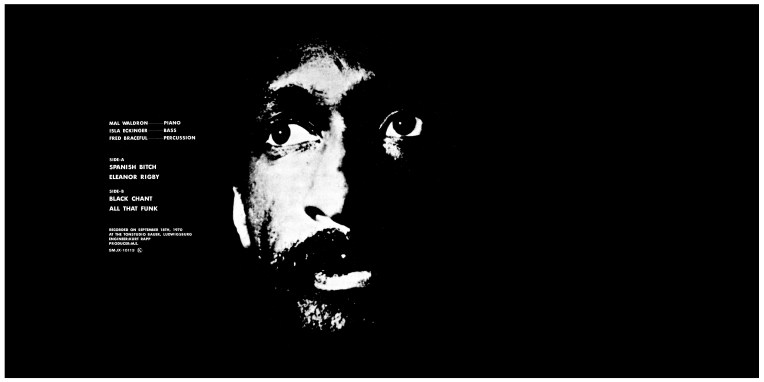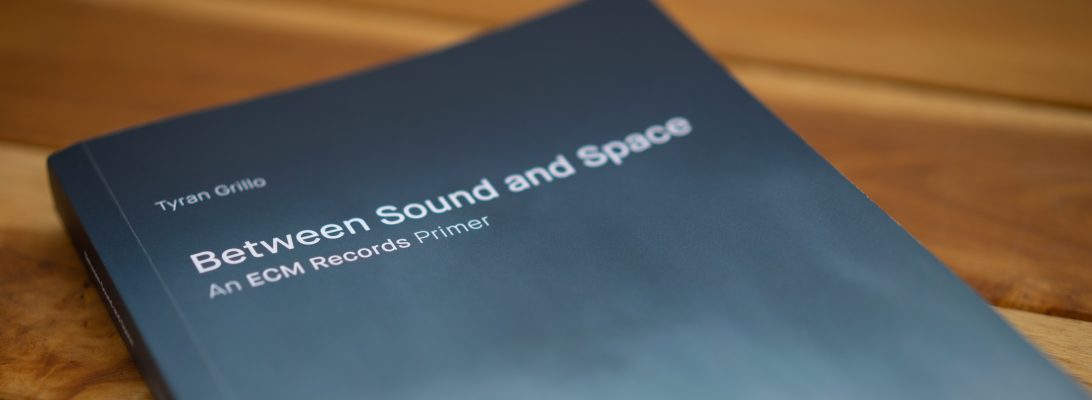
Mal Waldron
Spanish Bitch
Mal Waldron piano
Isla Eckinger bass
Fred Braceful percussion
Recorded September 18, 1970 at Tonstudio Bauer, Ludwigsburg
Engineer: Kurt Rapp
Produced by Manfred Eicher
Post-bop master Mal Waldron may just be the most important musician in ECM history, if only because his Free At Last was the label’s first bona fide release, opening a doorway to a paramount catalog of music. And while that seminal album, recorded in 1969, has recaptured the spotlight in a recent vinyl reissue, listeners may not be aware that Waldron stepped into the studio a year later to lay down a sequel of sorts. Recorded at Tonstudio Bauer, with Kurt Rapp engineering and Manfred Eicher producing, the curiously titled Spanish Bitch never made it to ECM proper and was released instead in Japan on the Globe label. Like its predecessor, Spanish finds the pianist in a trio setting, once again with go-to bassist Isla Eckinger but now, in place of Clarence Becton, welcoming Fred Braceful on drums.

SIDE A opens with the eponymous tune, and through its modal affiliations nods in the direction of Miles Davis and John Coltrane, who also appropriated Spanish scales for effect. In his hands, however, such motifs take on an almost ritualistic quality as scaffolding for an idiosyncratic reverie. From a web of bass and plucked piano strings emerges a vibrant block of chords. Waldron sets aside the theme almost as soon as he develops it, using it as a springboard for his laser-focused energy. Eckinger’s unusual solo sets up Waldron’s phenomenal own, building to steadfast density and playing off Braceful with glorious aplomb. This is followed by Waldron’s audacious take on “Eleanor Rigby.” A somewhat warped version of this evergreen, it boasts a robustness of architecture such as only Waldron could blueprint. He owns the song from start to finish, turning it into something of a macabre lullaby.
SIDE B pulls us back into original territory with the laddering effect of “Black Chant.” Initial restraint waters a muscular flower of high tone clusters over a plowing left hand. Though the aesthetic is Waldron’s own, it incorporates the voices, movements, and hardships of many who came before him. But don’t mistake this for catharsis. It is, rather, a link in a humble chain. Another original, “All That Funk,” saves the strongest for last. Here Waldron swings hard like a ton of rocks, leaving plenty of room for Eckinger’s forthright exposition before punctuating a groovy dialogue with Braceful. Here most of all, Waldron’s playing comports itself as a force to reckon with in three dimensions. Thus, his willingness to go deep into the darkest parts of his musical soul yields blinding light.

As a service to completists, below I have translated the original Japanese liner notes by jazz critic and producer Masahiko Yuh (悠雅彦):
The first thing to catch my eye is this album’s title, Spanish Bitch. It brings me back to one late May evening, when Mal was listening to Miles’s widely lauded Bitches Brew in an apartment not too far from the center of Munich. Mal just sat there without a word, casting his gaze in my direction from time to time to show me how much he admired the extraordinary beauty of Miles’s music. I can still see that gentle smile.
“Anyone would be captivated by this music on the surface. But the real beauty of Miles is on the inside. It’s amazing, don’t you think?”
I’ll never forget the way Mal’s eyes sparkled as he said this. There’s no reason to think he would be married to his choice of album title here. This music, painted as it was on his canvas, clearly differs from the world of sorcery and black magic that so enamored Miles (Bitch = Witch), who had incorporated a representative mode of Spanish folk music for little more than exotic effect. That said, remembering Mal’s expressions of enthusiasm, I like to think that perhaps in using the word “Bitch” he had Bitches Brew somewhere in mind. And as the light percussion of Ina’s knife from the dimly lit kitchen mingled pleasantly with Miles’s trumpet, it may be that the concept behind Spanish Bitch was already starting to take shape. As I made to leave, Mal handed me a copy of the ECM label’s first release, his own Free At Last (Japanese catalog number SMJX-10098). About four months later, on September 18, 1970, Mal would head into Tonstudio Bauer in the city of Ludwigsburg with bassist Isla Eckinger and drummer Fred Braceful to record his second album for ECM, Spanish Bitch.
… . … . … . …
Mal Waldron vanished from the American jazz scene in 1965, when he moved across the pond to Europe. It would be fair to say, however, that he had already been primed to do so since ’62, when his singular career as a jazz pianist came to a halt. In ’63, a long bout with illness left him virtually unable to perform. Moreover, life in America had hijacked his creative ambition. And so, as had happened over the past few years when playing with Mingus and Dolphy, among others, there was no longer anything to ignite his passion.
In ’64, Mal wrote his first film score for Cool World. “Not even that lit a fire under me to perform,” he recalls. At the time, Mal was shut in with his parents, who lived in Jamaica, Queens. But then, another composing gig: this for a French film called Three Rooms in Manhattan. Gleefully, he flew to France and, after a month of taking in the freer air of Paris, completed his score.
A brief return home found him hurriedly putting the finishing touches on scoring and recording for the film Sweet Love, Bitter, by then already intent on putting America behind him. This was how Mal, once separated from performing in earnest, ended his film composing career as quickly as it began. He also knew that a host of new creative endeavors awaited him in Europe.
And that was how, in the fall of 1965, he settled down in Paris at last. That same year and the next, Mal took part in the Bologna Jazz Festival. It was during that time that he recorded his well-known tune “All Alone” and moved to Germany by way of Italy at the end of ’66.
He landed in Munich in ’67 and never left, and since then has become a fixture of this city.
Munich was love at first sight. Here he discovered Swiss bassist Isla Eckinger and American-born drummer Clarence Becton, the talented jazzmen with whom he would play on Free At Last. He was able to take short trips to European capitals and make a living by performing jazz. It’s easy to imagine how much contentment it brought him. Above all, however, it was the superlative atmosphere of the Domicile jazz club, where he enjoyed performing every night, and where the ancient and the modern comingled in perfect accord, that kept him there. The atmosphere in Munich was the freshest and most alive in all of Germany.
Nearly every jazz fan and musician who set foot inside the country paid a visit to Munich, where they were sure to drop by Domicile. Dusko Goykovich led his big band there, bringing verve to a packed house amid uproarious applause. Recently, bassist Jimmy Woode sat in with Mal’s trio, and, much in contrast to Mal’s deadpan demeanor, coaxed smiles from the crowd like a circus clown. Pony Poindexter, stopping over on his way to Belgium, was also welcomed onstage. With alto in hand, he gave a laid-back performance. One night it would be Benny Bailey, the next it might be the Clarke-Boland Big Band delighting audiences to overflowing. Such was the energy Domicile was known for. Only when Mal sat down at the piano did an apparently miraculous silence take over the room. His profound reverberations and faint tone colors coiled about the feet of everyone squatting next to all those great black musicians whose portraits hung on every wall. It was most unbefitting of this city’s nondescript lights and the hammering of Olympic construction outside. I dare say, his own hammering thundered more eternally. Still, Mal’s acute sensibilities already had a whiff of German folklore to them, combining with his ancestral blood to produce an even deeper, heavier reverberation. We both remember that time, when he recorded “All Alone” during his brief Italian sojourn, a tune replete with the sun of the south country in all its warped beauty, laden with transparent pathos…. I don’t know anyone who so intuitively grasps the plight of ethnic peoples and who struggles so earnestly with his own music as Mal.


Thanks Tyran. Very interesting and helpful. Do you happen to know if ECM (or anyone else) intends to reissue this recording?
I have no idea whether a reissue is in the works, but it certainly warrants one (though the title might be a tough sell in this day and age).